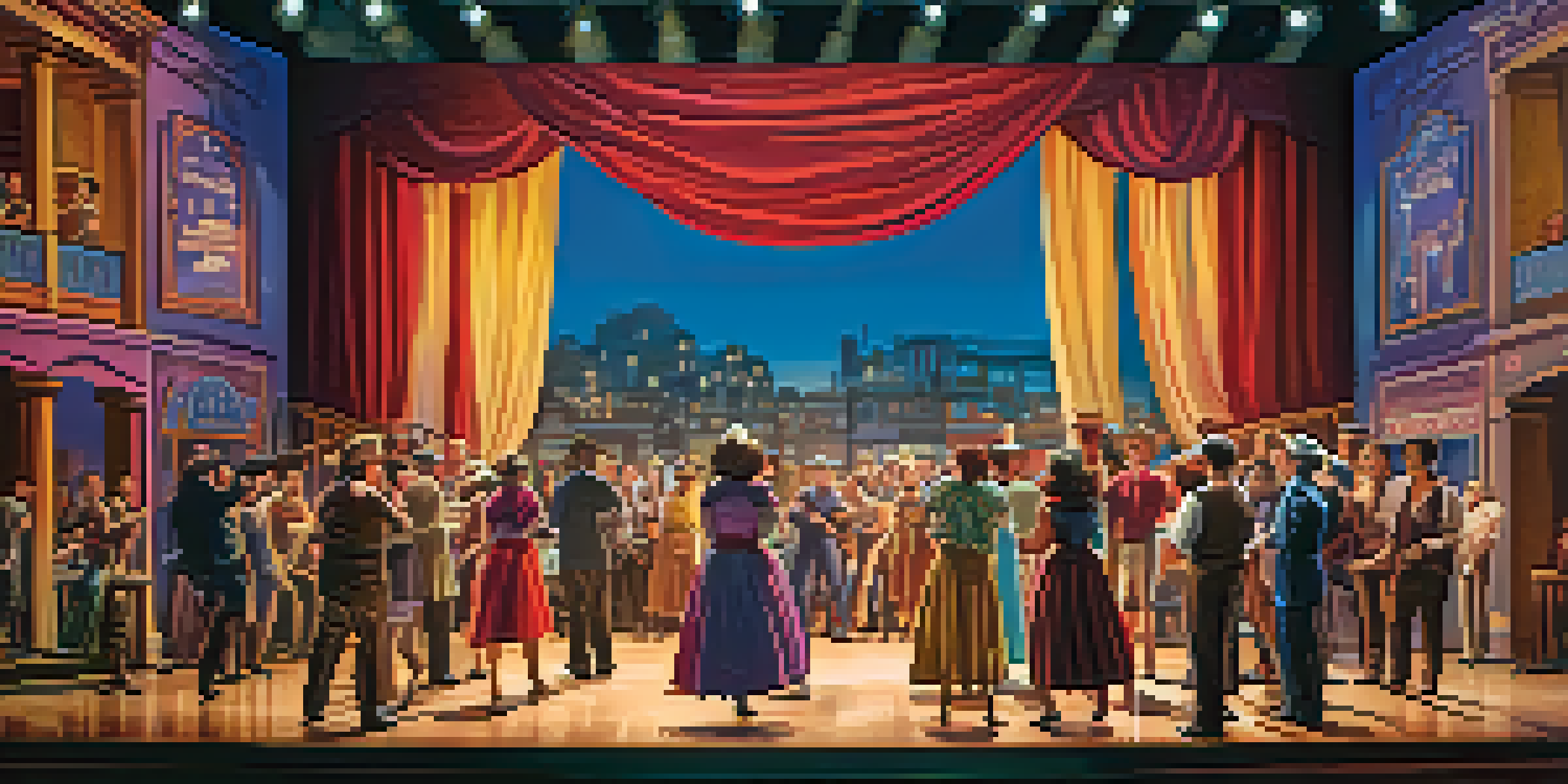Theatrical Excellence: New Jersey's Contributions to Performing Arts

A Rich History of Theatrical Innovation in New Jersey
New Jersey's theatrical roots run deep, with its history stretching back to the colonial era. Early performances often took place in taverns and inns, where local actors would entertain patrons with plays and music. This grassroots approach laid the foundation for a vibrant performing arts scene that continues to thrive today.
The theater is a place where we can tell our stories, share our dreams, and connect with each other.
As the 19th century rolled in, cities like Newark and Camden became hotspots for theatrical productions. The establishment of playhouses and opera houses attracted talent from all over the nation, creating a melting pot of artistic expression. This period not only showcased local talent but also invited renowned performers who would leave a lasting mark on the stage.
Today, New Jersey's historical contributions are celebrated in museums and cultural institutions. These venues preserve the stories of past performances, reminding visitors of the state’s pivotal role in shaping American theater. Understanding this history enriches the appreciation of contemporary performances and the evolution of the arts.
Influential Playwrights and Artists from New Jersey
New Jersey has been the birthplace of many influential playwrights and artists who have made significant contributions to the theatrical landscape. Notable figures like Anne Hathaway and Paul Robeson have roots in the Garden State, bringing their unique perspectives and talents to the stage. Their works often reflect the complexities of identity and culture, resonating with audiences both locally and nationally.

In addition to playwrights, New Jersey has also produced a plethora of talented actors and directors. From the legendary Meryl Streep to the innovative George C. Wolfe, these artists have not only excelled in their craft but have also paved the way for future generations. Their successes inspire aspiring performers to pursue their dreams in an industry that thrives on creativity and expression.
New Jersey's Theatrical Legacy
New Jersey has a rich history of theatrical innovation that continues to influence the performing arts today.
These artists often return to their roots, participating in local productions and mentoring young talent. This cycle of giving back strengthens the community and fosters a new generation of performers, ensuring that New Jersey remains a vital part of the performing arts narrative.
The Importance of Community Theaters in New Jersey
Community theaters play a crucial role in New Jersey’s performing arts scene, serving as platforms for local talent to shine. These grassroots organizations provide opportunities for aspiring actors, directors, and playwrights to hone their craft in a supportive environment. They often showcase a mix of classic and contemporary works, catering to diverse audiences.
Art is not a thing; it is a way.
Moreover, community theaters foster a sense of belonging and connection among residents. They become gathering places where individuals can share their love for the arts, participate in workshops, and engage in discussions about various productions. This community involvement helps cultivate a rich cultural fabric that enhances the overall artistic landscape.
The impact of these theaters extends beyond the stage, often collaborating with schools and local organizations to promote arts education. By nurturing the next generation of performers, community theaters contribute to a vibrant future for the performing arts in New Jersey.
Broadway's Influence and New Jersey's Connection
New Jersey's proximity to Broadway has created a unique relationship that influences the performing arts across the state. Many talented individuals from New Jersey have found success on the Great White Way, bringing back inspiration and experience to their hometowns. This connection fosters a thriving ecosystem where local talent can aspire to reach Broadway heights.
Furthermore, New Jersey is home to numerous theaters that feature Broadway shows and touring productions. Venues like the Paper Mill Playhouse and the New Jersey Performing Arts Center provide audiences with access to high-quality performances, bridging the gap between local talent and national productions. These theaters often serve as launching pads for shows that eventually make their way to Broadway.
Community Theaters Foster Talent
Community theaters in New Jersey provide vital platforms for local artists, nurturing talent and fostering community engagement.
The impact of Broadway on New Jersey’s arts scene is evident in the state’s vibrant musical theater culture. Local schools and community organizations frequently produce their own versions of popular shows, encouraging creativity and collaboration among young performers. This dynamic exchange enriches the arts community and keeps the spirit of theater alive.
Educational Institutions Shaping Future Performers
New Jersey is home to several prestigious educational institutions that focus on the performing arts. Schools like Rutgers University and Montclair State University offer specialized programs in theater, dance, and music, nurturing the talents of aspiring artists. These programs often feature hands-on training, allowing students to gain practical experience while learning from industry professionals.
In addition to higher education, many local high schools and community colleges have robust performing arts programs. These institutions provide young artists with opportunities to participate in productions, workshops, and festivals that hone their skills. This early exposure is crucial for developing the next generation of performers and creators.
Moreover, these educational institutions frequently collaborate with local theaters, creating a symbiotic relationship that benefits both students and the community. Such partnerships allow students to engage with real-world experiences, enhancing their education while contributing to the local arts scene.
The Role of Festivals in Celebrating New Jersey's Arts Scene
Festivals play a significant role in showcasing New Jersey's diverse performing arts community. Events like the New Jersey Film Festival and the Montclair Jazz Festival highlight local talent and attract visitors from all over the region. These festivals celebrate artistic expression in various forms, providing a platform for performers to share their work with a broader audience.
In addition to highlighting established artists, festivals often feature emerging talent, giving new voices a chance to be heard. This emphasis on inclusivity fosters a sense of community and encourages collaboration among artists from different disciplines. Attendees get to experience the rich tapestry of New Jersey's performing arts scene firsthand, making these events a highlight of the cultural calendar.
Festivals Celebrate Local Arts
Arts festivals in New Jersey showcase diverse talent and promote collaboration, enriching the cultural landscape of the state.
Moreover, festivals often include workshops and panels, offering valuable insights from industry professionals. These educational components engage attendees and aspiring artists, fostering a deeper appreciation for the arts. As a result, festivals not only entertain but also educate, ensuring that the legacy of New Jersey's performing arts continues to grow.
The Future of Performing Arts in New Jersey
As we look ahead, the future of performing arts in New Jersey appears bright and full of potential. With a rich history and a strong foundation in education and community engagement, the state is well-positioned to continue nurturing talent. Emerging artists are constantly innovating, finding new ways to connect with audiences and push the boundaries of traditional performance.
Technological advancements also play a role in shaping the future of theater. Virtual performances and online platforms have expanded access to the arts, allowing artists to reach wider audiences beyond traditional venues. This shift presents exciting opportunities for collaboration and creativity, enhancing New Jersey's reputation as a hub for artistic expression.

Ultimately, the continued support from local communities, educational institutions, and arts organizations will be crucial in fostering a vibrant performing arts scene. By embracing diversity and encouraging innovation, New Jersey can ensure that its contributions to the performing arts remain impactful for generations to come.